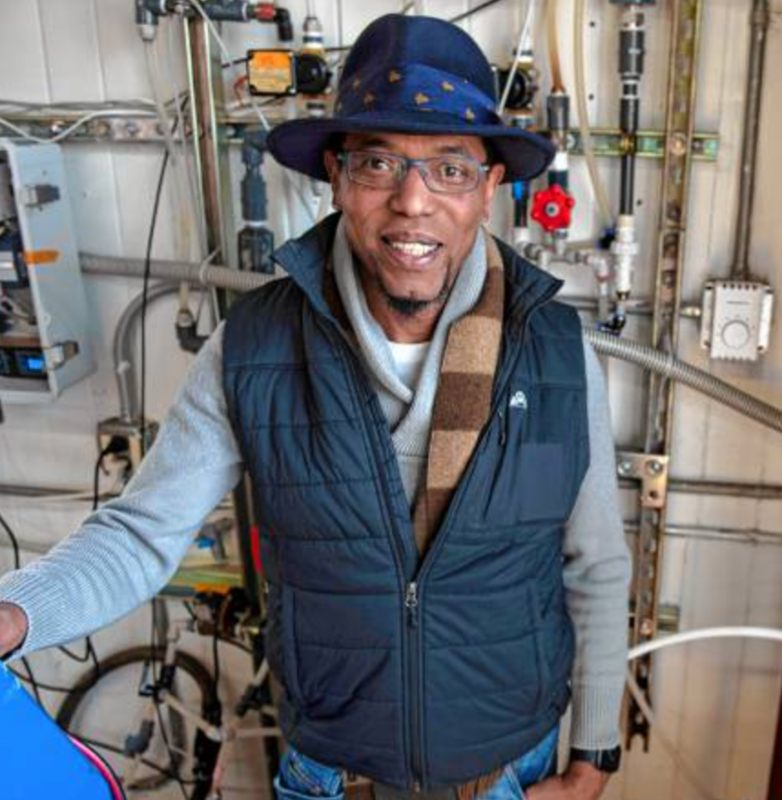UMass startup Elateq Inc. wins state grant to deploy new technology
Published on by Water Network Research, Official research team of The Water Network in Technology
Elateq’s patented technology uses low-level electricity and proprietary carbon material developed by Elateq. The novelty of our technology intertwines and improves the properties of carbon and the electrochemical process. The concept relies on the basics of electrochemistry but enhanced by innovative design and application of electric field, providing multiple zones of reaction for different contaminants.
The unique concept behind the technology enables simultaneous removal mechanisms such as electrochemical oxidation, reduction, ion exchange, and (electro)sorption within the treatment unit.
Simply put, multiple steps of contaminants removal happen within a single treatment unit as the contaminated water passes through leaving behind heavy metals, nutrients, pathogens, and toxic man-made chemicals.
In the four years since its founding on the UMass campus, startup Elateq Inc., a water treatment and hardware company, has landed contracts big (think PepsiCo) and small (think town of Amherst).
Now the company, which uses advanced electrochemical technology to treat wastewater and produce treatment products, has received a $92,000 grant from the Massachusetts Manufacturing Accelerate Program to assist with the purchase of new equipment as it seeks to continue its early growth for its all-in-one water treatment system.
“We are looking for a bright future,” said CEO Roderick Anderson. 
Anderson co-founded Elateq in March 2020, at the start of the pandemic, with Ljiljana Rajic, a former research scientist at Northeastern University whom he met about seven years ago.
Anderson, who taught at Trinity College, abandoned his liberal arts studies and started his own business, as a way to have a greater influence on the world after 11 years of “preaching from the periphery.”
“I was passionate about my research, but I did not want to do it anymore,” said Anderson. “I want a more sustained job and to produce real-world, tangible things.”
He said he and Rajic share a common goal to pursue a different life and get out of a laboratory.
“Give it a try, so operating a company is our mutual goal to work on our projects outside of the universities,” said Anderson.
Elateq’s first contract was with the town of Amherst, which hired the company to apply its technique as a pretreatment to extract heavy metals from groundwater that was corrupting the town’s pumping station.
They used state funding available from the Massachusetts Clean Energy Center’s Catalyst Program to demonstrate a new approach: solar and storage-powered systems, using solar energy to purify water in a more sustainable and eco-friendly way.
The process traditionally has involved using reverse osmosis systems to power water filtration systems, which involves many steps and a significant amount of energy. Solar-powered systems are thought to be superior in terms of sustainability, energy efficiency, and environmental impact because they do not require electricity.
“Our solar system is very unique,” Anderson said.
Amherst served as the starting point, but Elateq is currently a rising star with more global impacts.
They started working with PepsiCo last year, the second-largest food and beverage corporation in the world, to cleanse wastewater by using less energy via electrochemical means, eliminating pathogens as well as organic and inorganic pollutants.
Elateq is the only water treatment company selected to work with Pepsi’s European supply chain, and Anderson says its system is helping the giant company work toward its 2030 objective of 100% water recovery at all of its manufacturing production facilities worldwide.
With the new state grant, the Amherst startup aims to buy equipment and pursue technological advancements that they believe would increase equipment efficiency.
“We need advanced equipment to help us generate the macro electrodes, and get them ready for assembly,” said Anderson.
One to three of the employees at the firm, located at 240 Thatcher Road, will go through additional training funded by the state grant. The company has three full-time workers and five to 10 contract employees.
MMAP, launched by the Center for Advanced Manufacturing in 2021, invests in initiatives that help employers meet production techniques that rely on smart technologies, such as data analytics, artificial intelligence, and clouded computing. Elateq is one of 17 businesses funded in the current round for a total of $3.14 million.
“The Center for Advanced Manufacturing is confident that these targeted investments can help manufacturers increase the adoption of digital technologies across our supply base, leading to increased productivity and competitiveness. Without this, the industrial capacity across our state and country will be limited. We are thrilled to support innovative companies like Elateq which are well poised for growth and success,” said CAM Director Christine Nolan.
Elateq will use the MMAP grant to purchase more advanced machinery that help create the needed electrodes for water treatment. Most of the imported equipment currently in use needs to be updated, making it difficult for American businesses to use these older machines due to the inefficiency, Anderson said.
In addition, the cost of new equipment makes it nearly impossible for businesses to increase their production capacities without financial assistance.
Anderson added that the grant will help them scale up the business, increase their global influence, and elevate their standing in the industry in the current situation.
“We’ve already set a whole lineup of market verticals, but we will keep growing,” he said. “And let’s make the magic happen.”
Attached link
https://www.gazettenet.com/Elateq-wins-a-state-grant-to-deploy-cutting-edge-technology-to-transform-water-treatment-54676307Taxonomy
- Chemical Treatment
- Electrochemical Activation
- Water, Waste Water Chemical & Treatment
- Water Treatment Chemicals Sales & Services